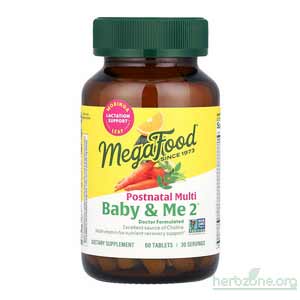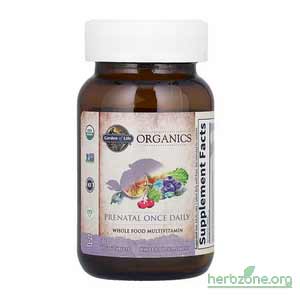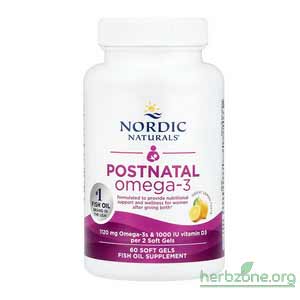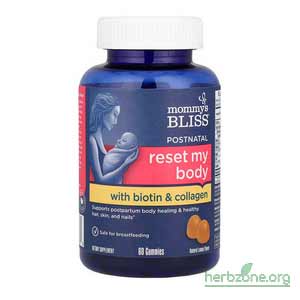Let’s be honest – childbirth is a major challenge for a woman’s body. After delivery, the body goes into recovery mode: internal resources are restored, hormones shift dramatically, and energy demands skyrocket. A drop in nutrient stores can lead to overall exhaustion. Add to that hormonal fluctuations, fatigue, and chronic lack of sleep… It’s no surprise that many women start experiencing low energy, hair loss, skin issues, and brittle nails. That’s why the postpartum period is a crucial time to support the body with essential vitamins and minerals – to help moms feel their best and have the strength to care for their baby. In this article, together with Herbzone, we’ll explore whether postpartum vitamins are necessary, how to choose the right ones, and which nutrients are most important during recovery.
In This Article:
- Which Vitamins Are Needed After Childbirth
- Should You Take Vitamins While Breastfeeding
- Whole Food Sources vs Supplements
- Symptoms Indicating Vitamin Deficiency
- How to Choose the Right Postpartum Vitamins
- How Long Should You Take Vitamins After Giving Birth
- Top 5 Best Postpartum Supplements from iHerb
Which Vitamins Are Needed After Childbirth
After giving birth, a woman’s body is still working overtime: recovery is in full swing, hormone levels remain unstable, and breastfeeding drains a significant amount of nutrients. To stay strong and energized, it’s essential to focus on key vitamins and minerals – either from food or in convenient supplement form.
| Nutrient | Main Functions | Notes / Features |
| Vitamin D | – Strengthens bones – Improves mood – Supports immunity | Deficiency is common; D3 is preferred; affects calcium levels and overall well-being |
| B Vitamins (B1, B2, B6, B12, folic acid) | – Energy metabolism – Nervous system function – Hair and nail strength – Reduces anxiety | Water-soluble – must be replenished regularly; B12 is especially vital for women who don’t eat meat |
| Iron | – Prevents anemia – Boosts energy – Supports hemoglobin production | Absorbed better with vitamin C; can cause constipation; ferritin levels should be monitored |
| Calcium & Magnesium | – Calcium: bones, teeth, muscles – Magnesium: reduces anxiety, improves sleep – Cardiovascular support | Calcium is better absorbed with vitamin D; magnesium calms the nervous system; both help with insomnia |
| Omega-3 (DHA) | – Lowers depression risk – Supports mom and baby’s brain – Heart health | DHA is essential during breastfeeding; choose purified formulas from trusted brands, free of mercury (read more on how to choose Omega-3 here) |
| Vitamin C | – Immune support – Tissue healing – Skin elasticity, pigmentation control | Powerful antioxidant; enhances iron absorption; aids recovery after C-section |
| Zinc, Biotin, Selenium | – Prevents hair loss – Improves skin and nails – Hormonal balance | Crucial for beauty and immunity; deficiencies are common postpartum |

Should You Take Vitamins While Breastfeeding
Yes – and not only can you take them, you should, as long as they’re chosen wisely. During breastfeeding, a mother’s body works like a turbo engine: producing milk requires a massive amount of nutrients every day. And naturally, most of the good stuff goes to the baby. That’s wonderful – but if those nutrient stores aren’t replenished, the mother can quickly end up in a state of deficiency.
Often, just a few weeks after giving birth, familiar warning signs start to appear: fatigue, low mood, brittle nails, dry skin, hair loss, weakened immunity. These are not just «hormones» or minor annoyances – they are real consequences of vitamin and mineral depletion.
To avoid this, it’s important to support the body from within. But it’s equally important to choose safe, breastfeeding-friendly supplements without unnecessary or potentially harmful ingredients.
What to Look for:
- Postnatal formulas – specially designed for the postpartum and breastfeeding period.
- Clean labels – free from artificial dyes, flavors, gluten, and GMOs. The simpler, the better for both mom and baby.
- Moderate dosages – more doesn’t always mean better. Some vitamins or minerals can be harmful in excess.

Whole Food Sources vs Supplements
Any nutritionist will tell you: a balanced diet is the foundation of good health. Food remains the primary source of essential vitamins, minerals, and antioxidants. But after childbirth, life changes – and a perfect diet becomes much harder to maintain.
Even with the best intentions, new moms face real challenges:
- No time to cook full meals
- Dietary restrictions due to baby’s colic, allergies, or personal intolerances
- Poor nutrient absorption due to stress, fatigue, or gut issues
- Low appetite or repetitive meals from sheer exhaustion
That’s where high-quality supplements come in – offering a reliable boost during recovery.
Benefits of Supplements in the Postpartum Period:
- Precise dosing – you know exactly how much of each nutrient you’re getting
- Fast and noticeable effects – especially when there are clear deficiencies
- Targeted formulas – postnatal vitamins are tailored for physical recovery, emotional balance, lactation, skin, hair, and immune health
The ideal approach? A smart combination: nutritious home-cooked meals + personalized vitamin and mineral supplements. This ensures your body gets what it needs to heal and thrive.
Comparison: Whole Foods vs Supplements
| Whole Foods | Supplements | |
| Source | Natural – vegetables, fruits, grains, proteins | Concentrated forms in pills, capsules, powders |
| Absorption | Varies with preparation, gut health | Absorbs well when taken correctly |
| Dosing | Hard to measure exact nutrient intake | Clear, labeled amounts in each dose |
| Availability | Depends on season, budget, appetite | Convenient, anytime use |
| Effect speed | Slower, depends on variety and consistency | Noticeable within 1-2 weeks for deficiencies |
| Personalization | Hard to tailor to exact needs | Easy to choose formulas for lactation, hair, immunity, etc. |
| Risks | Minimal with a balanced diet | Risk of overdose or poor product choice |
| Best approach | Healthy, diverse meals | Combined with safe, high-quality postpartum supplements |
A Few Natural Sources of Key Vitamins:
- Vitamin B12 – beef, eggs, liver (may not absorb well with gut issues)
- Folic acid – leafy greens, broccoli, avocado
- Vitamin C – kiwi, rosehip, sea buckthorn, bell pepper
- Calcium – sesame seeds, cheese, almonds, kale
- Iron – red meat, buckwheat, beets
- Omega-3 (DHA) – fatty fish (salmon, mackerel), flaxseed, walnuts
But to truly benefit from these, it’s not just about «eating healthy» – it’s about monitoring nutrient levels (via blood tests if needed) and choosing only those supplements that meet your body’s actual needs.

Symptoms Indicating Vitamin Deficiency
As we’ve already mentioned, the changes in a mother’s body don’t stop after childbirth – on the contrary, a new phase begins: the body actively uses its resources for healing, milk production, and hormonal adjustment. If there aren’t enough nutrients during this time, the body quickly starts «signaling» about it. The key is to recognize those signals.
Pay attention if you notice the following symptoms after giving birth:
- Excessive hair loss – one of the most common complaints among new moms. After delivery, estrogen levels drop sharply, and with them, the hair growth phase shortens. If the process is mild, it’s normal, but if hair is falling out in clumps, it’s a good idea to check your levels of iron, biotin, zinc, and vitamin D.
- Constant fatigue, apathy, drowsiness – of course, sleep deprivation plays a role, but if you feel exhausted even in the morning, it might be a sign of vitamin B deficiency (especially B12), iron, or magnesium.
- Anxiety, irritability, mood swings – these may have hormonal roots, but nutrient deficiencies often make them worse. Vitamin D, omega-3 (DHA), folic acid, and B6 are especially important here.
- Brittle nails or slow nail growth, white spots – may indicate a lack of calcium, zinc, or biotin.
- Skin problems: dryness, flaking, rashes – often a sign of a deficiency in fat-soluble vitamins A, E, D, and omega-3s.
- Frequent colds or slow recovery – the immune system is naturally weaker after childbirth, but if illnesses keep coming back, pay attention to vitamin C, D, and zinc.

How to Choose the Right Postpartum Vitamins
Today’s supplement market offers a wide range of options, which can feel overwhelming – especially when every bottle promises miracle results. But after childbirth, choosing supplements requires special care. This is a period of recovery, heightened sensitivity, and responsibility – not just for yourself but also for your baby (especially if you’re breastfeeding).
Here’s what to look for:
1. Certification
Certifications are more than just formalities – they’re a guarantee of product quality, purity, and safety. If you have to choose between an unknown brand and one with trusted certifications, always go with the latter.
Look for certifications like:
- NSF, USP – confirm that the contents match what’s stated on the label.
- GMP (Good Manufacturing Practice) – indicates adherence to strict manufacturing standards.
- Non-GMO, Gluten-Free, Dairy-Free – important for women with sensitivities or special dietary needs.
2. Form of Supplement
This is highly individual. Common forms include:
- Powders – to be mixed with water or juice.
- Capsules or tablets – pre-measured, convenient dosing.
- Chewables or gummy vitamins – often in sweet, candy-like form.
- Liquid supplements – ideal for those with digestive issues or poor absorption.
Capsules/tablets are typically the most convenient. Gummies may contain fewer nutrients but are more pleasant to take. Powders are usually the most cost-effective and allow for dose adjustments. Liquids are less common but suitable when other forms aren’t tolerated.
3. Optimal Dosage
After birth, the body requires higher levels of many nutrients. Look for supplements that provide at least 100% of the daily value for key nutrients – but without excessive amounts, as too much can burden the liver.
Here’s a table of recommended nutrient doses post-delivery:
| Nutrient | Recommended Dose | Role in the Mother’s Body |
| Folic Acid | 400–800 mcg | Supports blood formation, mood, and nervous system health |
| Vitamin D | 1000–2000 IU | Boosts immunity, bone health, and helps prevent depression |
| Iron | 15–30 mg | Prevents anemia, supports energy and oxygen transport |
| Iodine | 150–200 mcg | Essential for thyroid function and baby’s brain development |
| Omega-3 (DHA) | 200–300 mg | Supports brain, mood, and nervous system in mom and baby |
Always double-check to avoid overdosing – especially if you’re getting nutrients from food, individual supplements, and multivitamins simultaneously.
4. Individual Needs
Every woman has a unique postpartum experience. Supplements should be tailored to individual needs.
Here’s a table with specific concerns and matching supplement recommendations:
| Situation / Special Need | What to Look For in a Formula |
| Anemia or low iron levels | Iron in an easily absorbed form (e.g., bisglycinate), plus vitamin C |
| Breastfeeding | DHA (omega-3), higher vitamin D, calcium |
| Vegetarian / Vegan diet | B12, vegan D3, iron, zinc, omega-3 from algae |
| Prone to allergies | Hypoallergenic formulas free from dyes, flavors, soy, lactose, gluten |

How Long Should You Take Vitamins After Giving Birth
The worst thing you can do is rely on random internet advice about how long to take vitamins after giving birth. Everything depends on your body’s individual needs, lifestyle, and overall health. However, there are general recommendations worth following:
- On average, doctors recommend taking vitamin complexes for at least 3-6 months postpartum. That’s how long the body needs for basic recovery: tissue healing, hormonal balance, and immune system stabilization.
- If you are breastfeeding, it’s a good idea to continue the supplements for the entire breastfeeding period, since nutrients are being passed to the baby through milk every day, and your body needs to replenish those stores. Also read: Which vitamins should you take while breastfeeding?
Sometimes the deficiency symptoms we mentioned earlier (fatigue, hair loss, brittle nails, apathy) don’t go away even after a few months. In that case, it’s a good idea to:
- Get tested (ferritin, vitamin D, B12, zinc, etc.)
- Discuss your results with a doctor or nutritionist
- Continue the supplement course or switch to more suitable ones
Important: Don’t self-medicate or take random supplements blindly. Sometimes correcting just one or two nutrients is enough to resolve deficiencies and noticeably improve your well-being.
Top 5 Best Postpartum Supplements from iHerb
Here are the top-rated iHerb supplements for postpartum women, with short descriptions for easy navigation:
1. MegaFood Baby & Me 2
Contains B vitamins, C, D, iron, and iodine. Its main advantages are an organic formula and high bioavailability. These food-based vitamins are free from synthetic additives, making them suitable even for women with sensitive stomachs.
2. Garden of Life mykind Organics Postnatal
Ideal for those on a vegan or clean diet. This supplement is free from GMOs, gluten, and common allergens and is made from natural plant-based ingredients. It supports lactation and boosts energy during the postpartum period.
3. New Chapter Perfect Postnatal Multivitamin
A fermented vitamin complex that’s gentle on the stomach – even on an empty one. Helps support energy, mood, and lactation thanks to its mix of vitamins, minerals, and natural herbs.
4. Nordic Naturals Postnatal Omega-3
An essential supplement with high DHA content – key for brain, nervous system, and mood support. Each capsule provides 1120 mg of omega-3, including 580 mg of DHA. Especially beneficial during breastfeeding. Has a pleasant lemon flavor, no fishy aftertaste, and is easily absorbed. Can be taken alone or as a complement to your main multivitamin.
5. Mommy’s Bliss Postnatal Reset My Body with Biotin & Collagen
Specially designed chewable gummies with biotin and collagen to support postpartum recovery. They help restore energy, promote healthy skin, hair, and nails, and support immunity thanks to vitamins C, E, and zinc. Free from artificial flavors, colors, dairy, gluten, and soy, with a delicious natural lemon taste.
Conclusion
After childbirth, a woman needs care just as much as her baby. High-quality vitamins are not a luxury – they’re an essential tool for maintaining both physical and emotional health. A balanced supplement can help speed up recovery, prevent unpleasant symptoms, and allow you to fully enjoy motherhood.
Use promo code ANB8206 to get discounts ranging from 10% to 30% on all your purchases.
This code is valid permanently and can be applied to every order with no limitations!
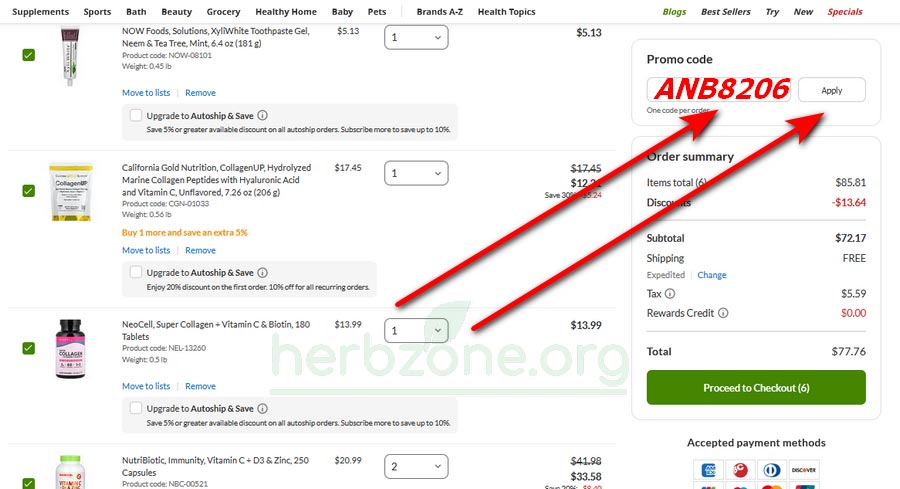
Frequently Asked Questions
Do I need vitamins if I eat well?
Yes. Even with a healthy diet, it’s difficult to meet all nutritional needs during intense recovery and lactation.
Which vitamins should I take after a C-section?
The same as after vaginal birth, but special attention should be paid to vitamins that promote wound healing (C, A, zinc) and iron.
What should I take for postpartum hair loss?
Biotin, B vitamins, iron, zinc, and selenium are key nutrients for healthy hair.
What’s the difference between vitamins for breastfeeding and non-breastfeeding moms?
Breastfeeding moms need higher amounts of DHA (omega-3), vitamin D, calcium, and iodine to support lactation and the baby’s health. Non-breastfeeding moms can focus on recovery-focused supplements like iron, B12, collagen, and biotin.

